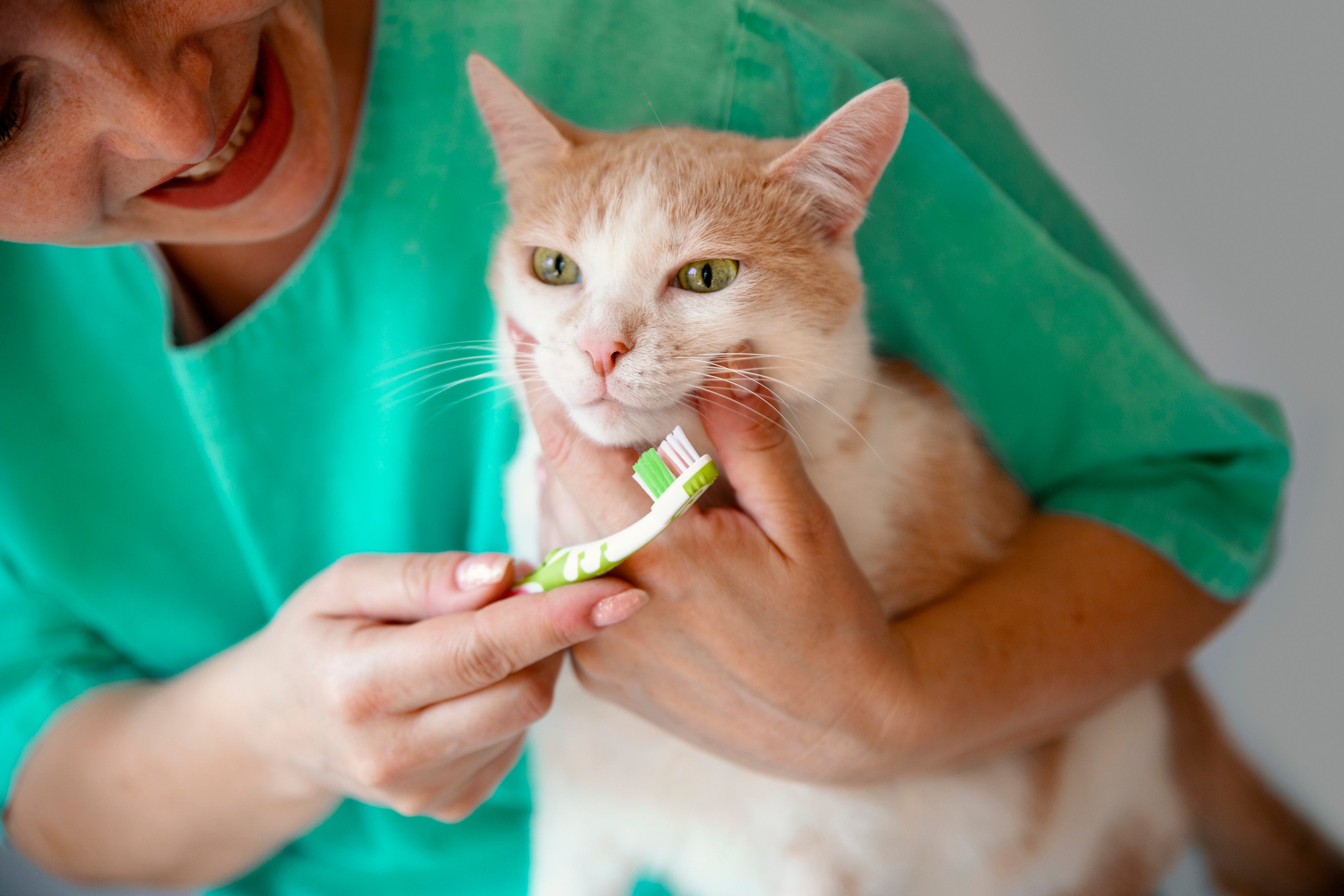Cat Dental Care: Why It Matters + The Best Treats for Healthy Teeth

As cat parents, we put a lot of thought into their nutrition and playtime, but one area that’s often overlooked is dental care. Just like us, cats are prone to plaque, tartar, and gum disease. In fact, dental disease is one of the most common health issues seen in cats over three years old. The good news? With a little prevention (and the right treats), you can help your cat keep their teeth clean and healthy for life.
Key Takeaways
-
Dental care is essential for cats. It prevents pain, supports overall health, and saves on vet bills.
-
Watch for warning signs like bad breath, drooling, difficulty eating, or swollen gums.
-
At-home care matters: brushing, dental gels, water additives, and yearly vet checkups all help.
-
Choose the right treats: opt for dental-specific chews or crunchy textures that help clean teeth.
-
Check out our guide for first time cat owners that can help with preventing health issues
- Gut health is just as important as dental health. Check out our guide on probiotics for cats.
Why Cat Dental Care Is Important
Prevents Pain & Discomfort
Gum disease and tooth decay can be painful, even if cats hide it well.
Supports Overall Health
Oral bacteria can enter the bloodstream and affect organs like the heart and kidneys.
Saves on Vet Bills
Regular dental care and preventive measures can reduce the need for costly cleanings or extractions.
Signs Your Cat May Have Dental Issues
Keep an eye out for:
-
Bad breath
-
Drooling
-
Difficulty eating or dropping food
-
Red, swollen gums
-
Visible tartar buildup
If you notice any of these, it’s a good idea to consult your veterinarian.
Cat Gum Disease Stages
1. Plaque Buildup
It begins when bacteria in your cat’s mouth combine with saliva and food particles. This forms a sticky film called plaque on the teeth.
2. Tartar Formation
If plaque isn’t removed (through chewing, dental treats, or brushing), it hardens into tartar (calculus). Tartar creates a rough surface where even more bacteria can thrive.
3. Gingivitis (Early Gum Inflammation)
The bacteria irritate the gumline, leading to gingivitis—red, swollen gums that may bleed easily. At this stage, it’s still reversible with proper care.
4. Periodontitis (Advanced Gum Disease)
If gingivitis is left untreated, bacteria spread deeper under the gumline, damaging the tissues that support the teeth. This is called periodontitis, and it can lead to:
-
Gum recession
-
Tooth loosening or loss
-
Painful infections
-
Bacteria entering the bloodstream, affecting organs like the heart and kidneys
At-Home Dental Care Tips
Brushing (if your cat allows it!)
Use a cat-safe toothbrush and toothpaste (never human toothpaste). Start slow, making it a calm, positive experience.
Dental Gels & Water Additives
If brushing feels impossible, these products can help reduce plaque-causing bacteria.
Vet Checkups
Annual dental exams and cleanings are the gold standard for preventing serious problems.
Dental-Friendly Cat Treat Recommendations
Not all treats are created equal! Look for treats designed specifically for dental health. Some options to consider:
-
Greenies™ Feline Dental Treats – Shaped to help scrub teeth while being tasty.
-
Purina Pro Plan Veterinary Diets Crunchy Bites Dental Cat Treats – Larger kibble size helps promote chewing and cleaning.
Tip: Avoid overly soft or sticky treats that can stick to teeth and contribute to plaque.
FAQ
Q: How common is dental disease in cats?
A: Very common. Most cats over the age of 3 show some signs of dental disease.
Q: Do cats really need their teeth brushed?
A: Yes! Brushing is the most effective way to remove plaque. If your cat won’t tolerate brushing, dental gels, water additives, or dental treats can still help.
Q: Can dental problems affect my cat’s overall health?
A: Absolutely. Oral bacteria can spread through the bloodstream and impact organs like the heart, liver, and kidneys.
Q: What are the early signs I should look for?
A: Bad breath, drooling, difficulty chewing, and red or swollen gums are common indicators.
Q: Are dental treats enough on their own?
A: Dental treats are a great supplement, but they work best when paired with other care, like brushing and regular vet checkups.
Q: Is gum disease reversible?
A: Gingivitis (early stage) can be reversed with proper care, but advanced periodontitis causes permanent damage and often requires professional treatment.
Q: Are certain cats more prone to dental issues?
A: Yes, older cats, some purebred breeds, and cats with weakened immune systems are at higher risk.
- Tags: Litter 101


